剑桥国际英语教程 2b unit15
剑桥少儿英语二级上Unit 15
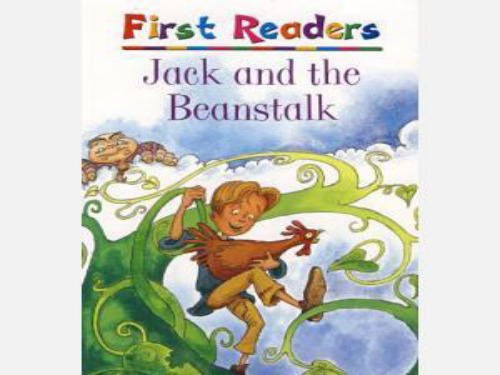
12 Next morni4ng 3 15 metres high
Jack was very happy , he climbed up and saw an old castle and a sleeping mons.ter
after?
He quickly c_u__t the b_e_a_n_s_ta_l_k.The monster _fe_l_l _down. Jack and his motherl_iv_e_d_happily ever after.
Jack was very happy, he climbedup and sawan old castle and a sleeping monster.
• What’s the Chinese for “fairy”? • Whose castle was it? • Who took the castle years ago? • Was Jack happy then?
• eg:
Jack’s mother asked him to sell the cow at the market.
• My teacher asks my classmates to sweep the floor every morning.
• 宾格
• me you him her it us you them
4) Sarah sometimes has sports. (划线部分提问) • How often does Sarah have sports? 5) There are 14 girls in my class.(划线部分提问) • How many girls are there in your class? 6) I see a film with Bill. (改为过去时) • I saw a film with Bill. 7) I go to the zoo. (改为过去时) • I went to the zoo. 8) You don’t answer my question. (改为过去时) • You didn’t answer my question. 9) I bought some meat yesterday. (一般疑问句) • Did you buy any meat yesterday?
剑桥国际英语教程interchange-2b-unit10(完整版)

mechanic [mə'kænɪk] , engineer
The investigative type: curious, likes to learn, analyze, situations, and solve problems.
entertainment • cruise ships: a large luxury boat that makes long
journeys • at sea: traveling on the ocean • I don't mind: ... doesn't bother me.
Part B Listen to Brad call about the job.
Jobs: veterinarian [ˌvetərɪˈneəriən] , pharmacist, detective,systems analyst
The artistic type: imaginative, likes to express himself of herself by creating art.
二、 The format and writing points: (1)Title: A cover letter for a job application (2)Appellation [ˌæpəˈleɪʃn] (称呼):The recipient’s [rɪˈsɪpiənt] name and position. (3)Contents: always three to four paragraph
• child-care worker • baby-sister • composer • aerobics [eəˈrəʊbɪks]
剑桥少儿英语二级下册Unit15

B:•It’s1b.etwLeeonothke,dorgeaandd thaenmdans. earch.
The lion is behind the big truck at the bottom of the picture. The parrot is in the yard in the middle of the picture. The snake is near the swimming pool. The cow is under the tree on the right side of the page. The pigs are in front of the red car on the left side of the picture. The rabbit is in front of the shopping window on the top of the picture. The crocodile is behind the tiger on the top of the picture. The bird is on the roof of the bookshop. The elephant is between the yard and the black car in the middle of the picture. The monkey is behind the gray car at the bottom of the picture. The sheep is behind the man. The duck is between the elephant and the snake. The tiger is between the dog and the crocodile on the top of the picture.
剑桥少儿英语二级Unit15Thebeanstal说课稿

剑桥少儿英语二级Unit15Thebeanstal说课稿剑桥少儿英语二级Unit15 The beanstal说课稿一、教材分析:本课是故事教学,在学生已学动词的一般过去时态的基础上强调本课出现的动词过去式单词的理解和运用。
整个故事采用阅读教学的步骤。
二、学情分析:五年级的学生对于英语已经有了一定的自主学习能力,同时,学生已经学习了动词的一般过去时并已经掌握了较多的动词过去式单词和动词短语,为本课时的'学习打下了基础。
本课时,学生将在已学动词过去式和短语的基础上,掌握一般动词过去时的构成以及部分不规则动词的过去式,同时,谈论过去时间内所干的事情。
三、教学目标:1 认知目标:能够听、说、读短语give t, next rning, clib up, fl t, tae fr, ce bac, fall dTeacher explain the ne3) ac saw 15 eters high.4) He clibed the beanstal and saw and .5) flew t ac and tld hi the castle was hers.6) He t and fr the castle.7) He the beanstal. The nster .Chse se ss. t answer(chec the answers)Read ut the sentences in grups.ⅳ. Read ut the s tr ne b ne picture. let ss. chse the picture t read in grups.ⅴ. Strength: In this str ,d u lie ac?Wh?ⅵ. Hewr.。
剑桥英语二级上册第十五单元课件MA-Unit15

Jack
The monster
Jack and his mother
fall down live happily cut the beanstalk
cut
He quickly cut the beanstalk . The
fall
monster fell down . Jack and his
live
saw an old castle and a sleeping
monster .
look up
stand up
Let sleeping dogs lie. Don’t ask for trouble.
get up
a sleeping bag sleeping beauty
He was very happy.
/ ka:sl /
n.城堡
城堡(英文名称:castle/fort)是欧洲中世 纪的产物,公元1066年至1400年是兴建城 堡的鼎盛时期,欧洲贵族为争夺土地、粮食、 牲畜、人口而不断爆发战争,密集的战争导 致了贵族们修建越来越多、越来越大的城堡, 来守卫自己的领地。
Jack was very happy ,he climbed up and
,
u—p —in—to—t—he—c—lou—ds .
Jack _w_a_s_ ( is ) very happy , he _c_li_m_b_ed ( climb ) up and __sa_w__ ( see ) an old castle and a _s_l_e_e_p_in_g__ (sleep ) monster .
Jack was very angry .
/ 'feəri /
剑桥国际英语教程第二册unit2-unit5
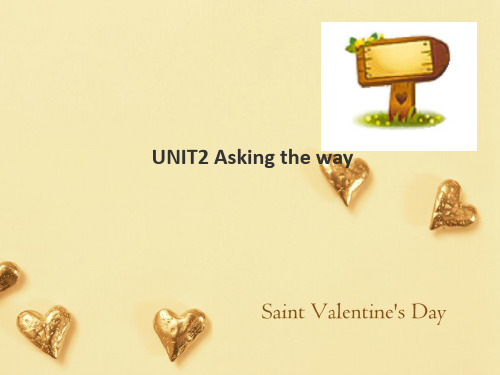
UNIT2 Asking the wayUnit 2 Caught in the rush •Lynn:Why is there never a bus when you want one?•Sam:Good question. There aren't enough buses on this route.•Lynn:Sometimes I feel like writing a letter to the paper.•Sam:Good idea.You should say that we need more subway lines,too.•Lynn:Yeah.•There should be more public transportation in general.•Sam:And fewer cars! There's too much traffic.•Lynn:Say,is that our bus coming?•Sam:Yes,it is.But look.It's full!•Lynn:Oh,no!Let's go and get a cup of coffee.•We can talk about this letter I'm going to write.•Exercise 3 Grammar focus•Adverbs of quantity With countable nouns•There are too many cars.•There aren't enough buses. We need more subway lines.•There should be fewer cars.•With uncountable nouns.•There is too much traffic . There isn't enough parking.•We need more public transportation. There should be less pollution.•Exercise 8 Conversation•Erica:Excuse me. Could you tell me where the bank is?•Man:There's one upstairs,across from the duty-free shop.•Erica:Oh,thanks.Do you know what time it opens?•Man:It should be open now.It opens at 8:00 A.M.•Erica:Good.And can you tell me how often the buses leave for the city?•Man:You need to check at the transportation counter.•It's right down the hall.•Erica:OK.And just one more thing.Do you know where the nearest restroom is?•Man:Right behind you ma'am.See that sign?•Erica:Oh.Thanks a lot.•Exercise 9 Grammar focus•Indirect questions from wh-questions wh-questions with be•Where is the bank? Where is the taxi stand?•Indirect questions•Could you tell me where the bank is? Do you know where the taxi stand is?•Wh-questions with do or did•How often do the buses leave for the city?•When did Flight 566 arrive? What time does the duty-free shop open?•Can you tell me how often the buses leave for the city?•Do you know when Flight 566 arrived?•Do you know what time the duty-free shop opens?•Exercise 10 Pronunciation Question Intonation•Wh-questions usually have falling intonation.•Indirect questions usually have rising intonation.•What time does the duty-free shop opens?•Can you tell me what time the duty-free shop opens?•Where is the taxi stand is? Do you know where the taxi stand is?•肮脏邋遢Unit 3 Time for a change!•Exercise 2 Conversation Apartment hunting•Mr.Dean:What do you think?•Mrs.Dean:Well,it has just as many bedrooms as the last apartment.•And the living room is huge.•Jenny:But the bedrooms are too small.•And there isn't enough closet space for my clothes.•Mr.Dean:And it's not as cheap as the last apartment we saw.•Mrs.Dean:But that apartment was dark and dingy.•And it was in a dangerous neighborhood.•Mr.Dean:Let's see if the real estate agent has something else to show us.•Evaluations with nouns•There aren't enough bedrooms. There isn't enough closet space.•Comparison with adjectives•It's not as cheap as the last apartment.•It's almost as cheap (as the last apartment.)•Comparisons with nouns..•It doesn't have as many bedrooms as the last apartment.•It has just as many bedrooms(as the last apartment).•Exercise 4 Pronunciation Sentence stress•Stress the words in a sentence that•carry the most important information.•The apartment isn't big enough. The kitchen is too cramped.•There aren't enough closets. There isn't enough light.EXERCISES•Exercise 7 Conversation Making wishes•Brian:So where are you working now, Terry?•Terry:Oh,I'm still at the bank.I don't like it, though.•Brian:That's too bad.Why not?•Terry:Well,it's boring,and it doesn't pay very well.•Brian:I know what you mean.I don't like my job either.•I wish I could find a better job.•Terry:Actually,I don't want to work at all anymore.•I wish I had a lot of money so I could retire now.•Brian:Hmmm,how old are you,Terry?•Terry:Uh,twenty-six.wishesadd more hours to the day change my appearancefind a better jobgo back to schoolbecomhealthier enjoy life moremake more newfriends•Exercise 8 Grammar focus Wish•Wish is followed by past tense forms but refers to the present.•Fact•I don't like my job.•Wish•I wish (that )I could find a better job.•I wish I worked somewhere else.•fact I live with my parents.•I wish I lived in my own apartment. I wish I didn't live with my parents.•fact Life is difficult.•I wish it were easier. I wish it weren't so difficult.Unit 4 I've never heard of that!•Kathy:Hey,this sounds good-snails with garlic!•Have you ever eaten snails?•John:No,I haven't.•Kathy:Oh,they're delicious!I had them last time. Like to try some?•John:No,thanks.They sound strange.•Waitress:Have you decided on an appetizer yet?•Kathy:Yes.I'll have the snails,please.•Waitress:And you, sir?•John:I think I'll have the fried brains.•Kathy:Fried brains? Now that really sounds strange!•Exercise 3 Pronunciation Reduced forms Listen and practice.•Notice how did you and have you are pronounced in these questions.•Did you skip breakfast this morning?•Did you cook your own dinner last night?•Have you ever tried Indian food? Have you ever eaten snails?•Exercise 4 Grammar focus•Simple past vs. present perfect Simple past;•completed events at a definite time in the past•Did you eat snails at the restaurant last night? No,I didn't.•Did you go out for dinner on Saturday? Yes,I did.•I went to a Korean restaurant last week.•Present perfect; events within a time period up to the present.•Have you ever eaten snails? No.I haven't.•Have you been to a French restaurant? Yes.I have.•I've never been to a Greek restaurant.•Kate:What's your favorite snack?•Jim:Oh,it's a sandwich with peanut butter, honey,and a banana.•It's really delicious!•Kate:Ugh!I've never heard of that!How do you make it?•Jim:Well,•first,you take two slices of bread and spread peanut butter on them.•Then cut a banana into small pieces•and put them on one of the slices of bread.•Finally,pour some honey over the bananas•and put the other slice of bread on top.Yum!•Kate:Yuck!It sounds awful!•Exercise 9 Grammar focus Sequence adverbs •First,spread peanut butter on two slices of bread.•Then cut a banana into small pieces.•Next,put the pieces of banana on one slice of bread.•After that,pour honey over the bananas.unit5 Going Places •What do you like to do on vacation?Exercise 2 Conversation•Julia:I'm so excited!We have two weeks off!What are you going to do?•Nancy:I'm not sure. I guess I'll just stay home.•Maybe I'll catch up on my reading.What about you?Any plans?•Julia:Well,•my parents have rented a condominium[,kɒndə'mɪnɪəm] in Florida.•I'm going to take long walks along the beach every day •and do lots of swimming.•Nancy:Sounds great!•Julia:Say,why don't you come with us? We have plenty ofExercise 3 Grammar focusFuture with be going to and will•Use be going to+verb to talk about plans you've decided on.Use will+verb with maybe.•probably,I guess,•or I think to talk about possible plans before you've made a decision.•Where are you going to go?I'm going to go to the beach.•I'm not sure.Maybe I'll catch up on my reading.•I'm not going to take a vacation.I probably won't take a vacation this year•What are you going to do?I'm going to do lots of swimming.•I guess I'll just stay home. I don't know.I think I'll go campingExercise 7 ConversationPart A Listen and practice.•Lucy:Hey,Mom.I want to backpack around Europe this summer What do you think?•Mom:Backpack around Europe?That sounds dangerous!•You shouldn't go by yourself.You ought to go with someone.•Lucy:Yes,I've thought of that.•Mom:And you'd better talk to your father first.•Lucy:I already did. He thinks it's a great idea.He wants to come with me!Exercise 8 Grammar focus•Modals for necessity and suggestion. Describing necessity•You have to get a passport. You must get a visa for some countries.•You need to take money.•For some countries, you don't have to get any vaccinations•Giving suggestions You'd better talk to your father.•You ought to go with someone. You should take warm clothes.•You shouldn't go by yourself.•Exercise 9 Pronunciation Ought to and have to •Notice the pronunciation of ought to•and have to in these sentences.•You ought to take a credit card. You ought to go in June.•You have to get a passport. You have to get a visa.WORD POWER•backpack cash credit card first-aid kit hiking boots•medication overnight bag passport plane tickets•shorts suitcase visa traveler's checks vaccination [,væksi'neiʃən]•windbreaker flashlight。
剑桥国际英语教程大纲

WRITTING
15
A RECIPE
作业
READING
20
FOOD AND MOOD
TOTAL
120
Unit3-4progress check
name
Time(MIN)
contents
Remarks
homework
SPEAKING
5
COMPOUND NOUNS
18
LISTENNING
----
SINGAPORE SOVLES IT
DISCUSSION
22
YOU BE THE JUDGE
WRITING
5
A LETTER TO THE EDITOR
作业
SNAPSHOT
5
DAILY WORDS
10SENTENCES
CONVERSATION
5
COULD YOU TELL ME…..
GRAMMAR FOCUS
Remarks
homework
LISTENNING
5
COMPOUND NOUNS
DISCUSSION
15
TRANSPORTATION SERVICES
ROLE PLAY
10
ADVERBS OF QUANTITY
SPEAKING
10
SINGAPORE SOVLES IT
TOTAL
40
SINGAPORE SOVLES IT
TOTAL
120
Unit6 OK.NO PROBLEM!
name
Time(MIN)
contents
Remarks
homework
最新最新最全剑桥二级上册Unit15

二级上Unit 15 I enjoy reading picture stories!教学目的和要求Teaching aims and demands 通过学习本单元,学生能看懂本单元的主题故事并能简单讲述该故事通过复习和学习,学生能掌握一定数量的动词短语和介词短语学生能谈论两张图之间的区别交际用语Expressions in communication I enjoy reading picture stories.Which comes first?What happen next?Match the ones that sound alike.Can you spot them all?Can you do one of the following things?重点朗读词汇Key words and expressions market, bean, angry, throw, beanstalk, castle, monster,fairy, seed, correct, order, English, comic, cooking, hide-and-seek, cupboard, onions, soup, grams, laugh, Anna,Ben, Daisy, Fred, Sally, Jill, Jim, John, Mary所需教具Key words and expressions 表示地点的方位介词短语卡片相关的动词短语的图片及词组卡片(第三部分)复印一些图片,让学生讲述两张图的不同之处本单元主题故事书或书的封面一些英文版的儿童故事图画书,如格林童话故事等如何导入教学?上课时,教师首先问大家:“Do you like to read books? Do you like to read English books? Do you like to read picture books? Do you like to read picture stories?’ 教师通过递进的方式一点一点地提出问题,边说边拿出自己的儿童故事书给学生看,并可以适当说一下书名。
剑桥二级上Unit 15
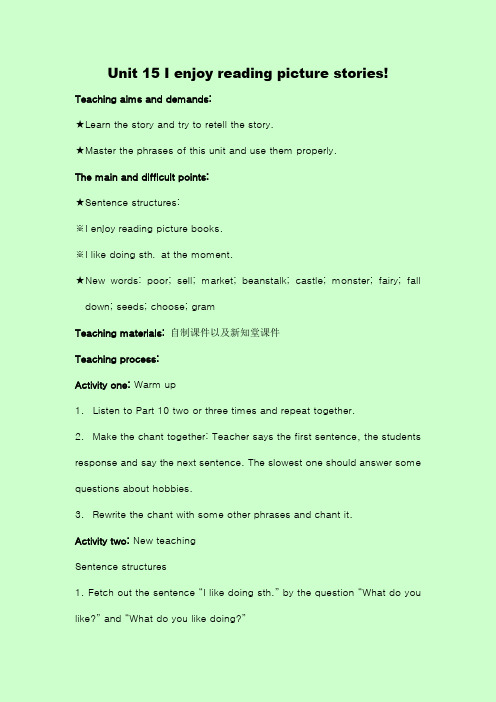
Unit 15 I enjoy reading picture stories! Teaching aims and demands:★Learn the story and try to retell the story.★Master the phrases of this unit and use them properly.The main and difficult points:★Sentence structures:※I enjoy reading picture books.※I like doing sth. at the moment.★New words: poor; sell; market; beanstalk; castle; monster; fairy; fall down; seeds; choose; gramTeaching materials:自制课件以及新知堂课件Teaching process:Activity one: Warm up1.Listen to Part 10 two or three times and repeat together.2.Make the chant together: Teacher says the first sentence, the students response and say the next sentence. The slowest one should answer some questions about hobbies.3.Rewrite the chant with some other phrases and chant it.Activity two: New teachingSentence structures1. Fetch out the sentence “I like doing sth.” by the question “What do you like?” and “What do you like doing?”2. Let them make sentences with the structure: like doing sth.3. Listen to teacher’s sentence: “I enjoy doing sth.” and explain the usage of “enjoy”.4. Game: Sentence relay.5. Response practice: Teacher says a sentence with “like doing sth.”, the students response and say “enjoy doing sth.”. Then have a change.6. 看自制课件sentence structures:Make sentences with these phrases and pay attention to the persons. ( likes/ enjoys)7. Look at Part 6. Make more sentences to strengthen the structures: like/enjoy doing sth. At the same time, pay attention to the phrase: at the moment.8. Make some more sentences to practice the structure.Activity three: Story time (自制flash课件)1. Look at the pictures one by one and ask questions about the pictures.For example: What’s this? What can you see in the picture? And so on.2. Watch the cartoon of the story: Jack and the beanstalk. Try tounderstand the story first.3. Look at the picture again. Try to answer the teacher’s questions about the story. For example: What was his name? Who was she? What did she ask Jack to do/sell?4. Retell each picture with their own words according to the answers of the teacher’s questions and the sentences under the picture.5. Listen to the story on the book. Retell the story again by themselves.6. Story relay: Each student says a sentence, then one after another and retell the story again.Activity four: Summary1. Make sentences with the phrases of this unit.2. Retell the short story.Activity five: Homework1. Listen to the tape of the story.2. Make sentences with structures: like/enjoy doing sth.本单元课件主要用于故事练习及本单元主句型的练习。
剑桥国际英语教程2bunit15
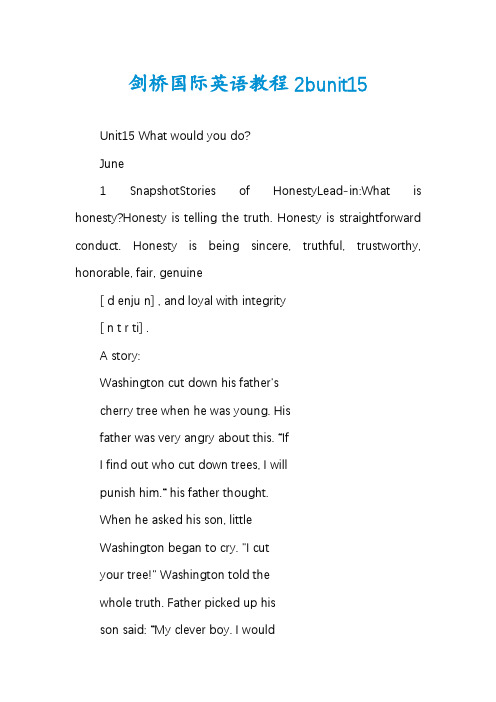
剑桥国际英语教程2bunit15Unit15 What would you do?June1 SnapshotStories of HonestyLead-in:What is honesty?Honesty is telling the truth. Honesty is straightforward conduct. Honesty is being sincere, truthful, trustworthy, honorable, fair, genuine[ d enju n] , and loyal with integrity[ n t r ti] .A story:Washington cut down his father'scherry tree when he was young. Hisfather was very angry about this. “IfI find out who cut down trees, I willpunish him.“ his father thought.When he asked his son, littleWashington began to cry. "I cutyour tree!" Washington told thewhole truth. Father picked up hisson said: “My clever boy. I wouldrather lose one hundred trees, thanlistening to you tell a lie .Honesty --What we should do ?Honesty is a basic principle of life, we should adhere to it.As a student, cheating is prohibited.As a researcher, plagiarism [ ple d r z m]剽窃is a sin.As a doctor, deceit[d sit]欺诈is stealing patients’right of livingAs a citizen, do not deceive [d 'si:v] 误导others.QuestionsDo you know any other stories like these?Have you ever found anything valuable? What did you do?Do you think that people who return lost things should geta reward?3 Grammar FocusUnreal conditional sentences with if clauses1. 虚拟语气在if条件状语从句中的用法与现在事实相反:(从句谓语动词)动词的过去式(be用were 而不用was)(主句谓语动词)should/ would /could/ might+动词原形与过去事实相反:(从句谓语动词)had + 过去分词(主句谓语动词)should/ would/could/might + have+过去分词与将来事实相反:(从句谓语动词)1.should+动词原形2.动词过去式3.were to+动词原形(主句谓语动词)should/ would/ could/ might +动词原形2 Conversation If I found 750,000What kinds of things were the people talking about?New words and expressions:you're kiddinggo straightgo to jailyou've got a pointa big rewardhonesty payPart BAns: Phil would take the money straight to the police.Expanding Questions:1. What can you buy with 750,000?2.What are the risks of keeping money that you find? How honest are you ?6 Word Power Antonyms [ nt n m]accept refuseadmit denyenjoy dislikeagree disagreeborrow lendremember forgetspend savedivorce marryaccept refusefind lostB Pair workChoose four pairs of opposites. Write sentences using each pair.Example: I can never save money because I spend it all onclothes.Interchange 15 Do the right thing!put it in a closethang it on the wallspank a childyell atcheat on a examon a highwaya flat tire7 Perspectives I felt terrible.Listen to people talk about recent predicaments.Prefer to GrammarPredicament 1, 2What went wrong? What did he do about it?If this happened to you, what would you have done?What predicaments happened to you recently, and how did you deal with it?4 Listening Tough predicaments1get a postcardon vacationisn't that horriblecredit cardright awayAmerican Express office美国运通公司get a loanWords and expressions:2a serious shopping problemkeep doingfinancial problemno questionnone of my businessa personal problemWords and expressions:3a tough situationwalk downpretty violentfigurebreak it upin the meantime11 Speaking I shouldn't have P104A Look at the five situations below. Think about the past month and write down an example for each situation.B Group work Talk about each situation in part A.12 Writing A letter to an advice columnist P 104a letter to an advice columist about problemchoose one to write a reply to10 Listening I'm calling about... P104Nowadays, many people call radio talk shows to ask for advice on personal problems. Have you ever listened to such shows? Do you kown what kinds of problems people usually ask about?。
剑桥国际少儿英语二级Unit15:让我们快点找到它
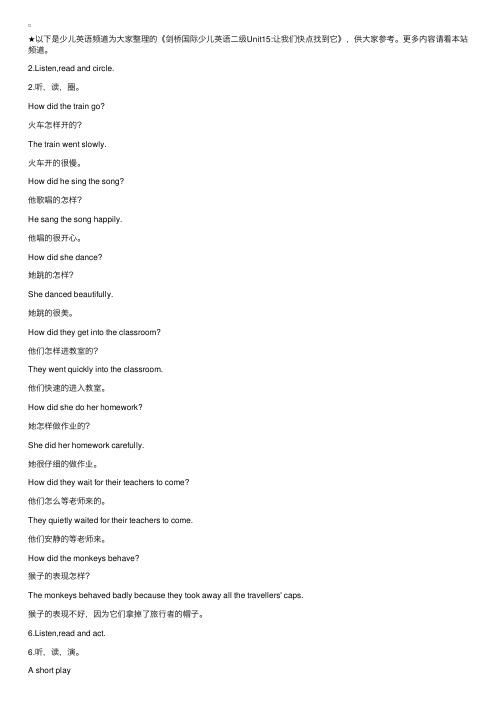
★以下是少⼉英语频道为⼤家整理的《剑桥国际少⼉英语⼆级Unit15:让我们快点找到它》,供⼤家参考。
更多内容请看本站频道。
2.Listen,read and circle.2.听,读,圈。
How did the train go?⽕车怎样开的?The train went slowly.⽕车开的很慢。
How did he sing the song?他歌唱的怎样?He sang the song happily.他唱的很开⼼。
How did she dance?她跳的怎样?She danced beautifully.她跳的很美。
How did they get into the classroom?他们怎样进教室的?They went quickly into the classroom.他们快速的进⼊教室。
How did she do her homework?她怎样做作业的?She did her homework carefully.她很仔细的做作业。
How did they wait for their teachers to come?他们怎么等⽼师来的。
They quietly waited for their teachers to come.他们安静的等⽼师来。
How did the monkeys behave?猴⼦的表现怎样?The monkeys behaved badly because they took away all the travellers' caps.猴⼦的表现不好,因为它们拿掉了旅⾏者的帽⼦。
6.Listen,read and act.6.听,读,演。
A short play⼀场短⼩的演出I’m hungry!我饿了!Mum, what's for dinner?妈妈,我们晚饭吃什么?You can have cookies.你可以吃曲奇。
剑桥国际英语教程2册

A time to remember
Snapshot Tell us about yourself
1. Do people use the Internet to make new friends in your country?
2. What do you think about chat rooms? 3. What do you think about online personal ads? 4. What kind of information do these people
Ted: Oh, I’m really sorry. Are you ok?
Ana: I’m fine. But I’m not very good at this.
Ted: Neither am I…. Say, Be (not) good at sth. (不)擅长
are you from south America?
messy neat Free time 空闲时间 Be into sth. = be interested in sth. Play sports 运动 Keep fit 保持身材,保持健康 Worry about 担心 Care about 关系 Too…to… 太…以至于不能…
Used to
moved here ten years agoM, ove to+ 地点:搬去某地
when I was in junior high
school.
Ted: And where did you learn to skate?
Ana: Here in the park. This is only my third time.
典范英语2b-15
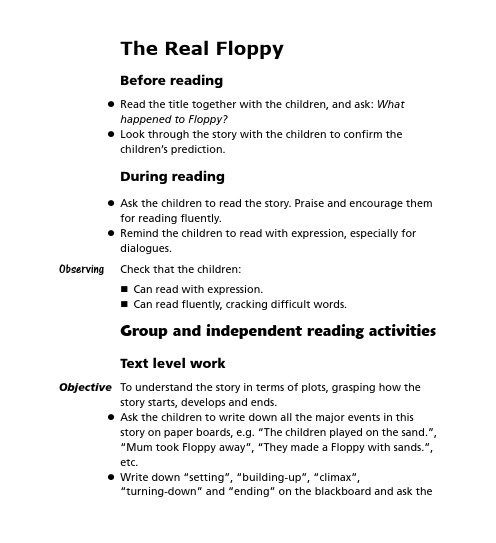
The Real FloppyBefore reading●Read the title together with the children, and ask: Whathappened to Floppy?●Look through the story with the children to confirm thechildren’s prediction.During reading●Ask the children to read the story. Praise and encourage themfor reading fluently.●Remind the children to read with expression, especially fordialogues.Observing Check that the children:⏹Can read with expression.⏹Can read fluently, cracking difficult words.Group and independent reading activitiesText level workObjective To understand the story in terms of plots, grasping how the story starts, develops and ends.●Ask the children to write down all the major events in thisstory on paper boards, e.g. “The children played on the sand.”,“Mum took Floppy away”, “They made a Floppy with sands.”,etc.●Write down “setting”, “building-up”, “climax”,“turning-down” and “ending” on the blackboard and ask thechildren to put the paper boards under each title.●Ask the children: Why did Mum take Floppy away?●Ask the children to retell the story. Ask them to include majorincidents and omit unnecessary details. Encourage them tocheck the book to see if they were right.Observing Are the children able to identify the major events of the story?Can they identify where the story comes to a turning-point?Can they decide the climax of the story?Sentence level workObjective To understand actions by acting out.●Write down the four sentences that include the word “ran” inpicture ①to ③.●Ask the children to understand the differences between “ranonto”, “ran after”, “ran back” and “ran up” by looking at thepictures.●Ask the children to act out the four actions.Observing Are the children able to use graphic clues to differentiate similar expressions?Word level workObjective To finds words that indicate actions.●Go through the story with the students and find out all thewords that indicate some kind of actions, e.g. “ran”, “said”,“play”, “look”, “take”, etc.●Ask the children to decide which words talk about things thathappened in the past.Observing Can they notice that those verbs can indicate things thatalready happened?Speaking and listening activitiesObjectives Share ideas about substitution of your favourite thing.●In a circle time, ask the children to talk about their favourite friend,pet animals, etc. Ask: Would you still be happy if it is substituted?Which one do you like best?●Ask: Why did Kipper say he loved the really Floppy best?WritingObjective To write down the whole story according to memory.●Ask the children to retell the story in simple sentences.●Ask the children to write down what they said into a complete story.。
剑桥国际儿童英语2
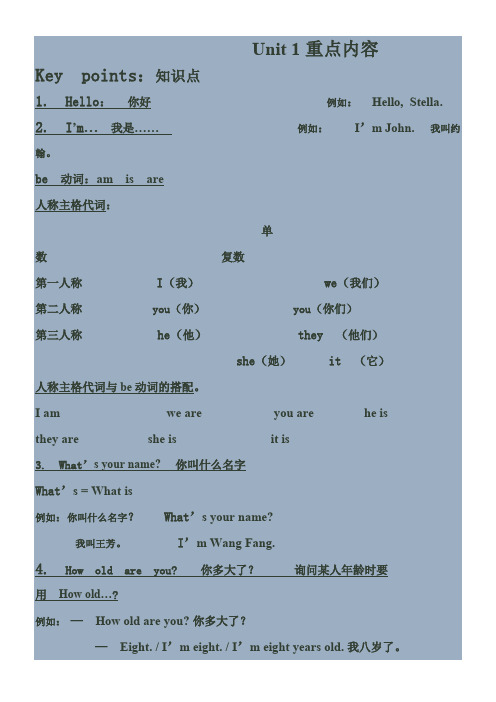
Unit 1 重点内容Key points:知识点1. Hello:你好例如:Hello, Stella.2. I’m…我是……例如:I’m John. 我叫约翰。
be 动词:am is are人称主格代词:单数复数第一人称I(我)we(我们)第二人称you(你)you(你们)第三人称he(他)they (他们)she(她)it (它)人称主格代词与be 动词的搭配。
I am we are you are he isthey are she is it is3. What’s your name? 你叫什么名字What’s = What is例如:你叫什么名字?What’s your name?我叫王芳。
I’m Wang Fang.4. How old are you? 你多大了?询问某人年龄时要用How old…?例如:—How old are you? 你多大了?—Eight. / I’m eight. / I’m eight years old. 我八岁了。
5. This is…这位是……向别人介绍某人时常用This is…例如:Mum, this is my teacher Mary. 妈妈,这是我的老师——玛丽。
This is my good friend, Jim. 这位是我的好朋友吉姆。
6.下列单词与音标、字母的联系。
g rey: [ ei ] a, h, j, k green: [ i: ] b, c, d, e, g , p, t, vred: [ e ] f, l, m, n, s, x, z white: [ ai ] i, yyellow: [ Eu ] o blue: [ u:] q, u, wdark brown: [ B: ] r7.指读练习材料: 学生用书第二页。
P art1 listen and point. CD1 2 STEALLA: Hello again. We’re the Star family. I’m Stella Star and I’m eight.This is my brother, Simon. He’s seven, and this is my sister, Suzy. She’s four. SIMON: This is my grandmother.She’s Grandma Star.GRANDMA: Hello.SIMON: This is my grandfather. He’s Grandpa Star.Grandpa, say hello.GRANDPA: Oh! Hello, everybody.MRS. STAR: And we’re Mr. and Mrs. Star.SIMON: What’s your name? How old are you?小故事知识点1. Let’s …让我们做……吧Let’s = Let us (’s是us的缩写)Let’s后面用动词原形,表示“让我们做……吧。
- 1、下载文档前请自行甄别文档内容的完整性,平台不提供额外的编辑、内容补充、找答案等附加服务。
- 2、"仅部分预览"的文档,不可在线预览部分如存在完整性等问题,可反馈申请退款(可完整预览的文档不适用该条件!)。
- 3、如文档侵犯您的权益,请联系客服反馈,我们会尽快为您处理(人工客服工作时间:9:00-18:30)。
Unit15 What would you do?June1 SnapshotStories of HonestyLead-in:What is honesty?Honesty is telling the truth. Honesty is straightforward conduct. Honesty is being sincere, truthful, trustworthy, honorable, fair, genuine[ˈdʒenjuɪn] , and loyal with integrity [ɪnˈtɛɡrɪti] .A story:Washington cut down his father's cherry tree when he was young. His father was very angry about this. “If I find out who cut down trees, I will punish him." his father thought. When he asked his son, little Washington began to cry. "I cut your tree!" Washington told the whole truth. Father picked up his son said: “My clever boy. I would rather lose one hundred trees, than listening to you tell a lie .Honesty --What we should do ?Honesty is a basic principle of life, we should adhere to it.As a student, cheating is prohibited.As a researcher, plagiarism [ˈpleɪdʒərɪzəm]剽窃is a sin.As a doctor, deceit[dɪˈsit]欺诈is stealing patients’right of livingAs a citizen, do not deceive [dɪ'si:v] 误导others.QuestionsDo you know any other stories like these?Have you ever found anything valuable? What did you do?Do you think that people who return lost things should get a reward?3 Grammar FocusUnreal conditional sentences with if clauses1. 虚拟语气在if条件状语从句中的用法与现在事实相反:(从句谓语动词)动词的过去式(be用were而不用was)(主句谓语动词)should/ would /could/ might+动词原形与过去事实相反:(从句谓语动词)had + 过去分词(主句谓语动词)should/ would/could/might + have+过去分词与将来事实相反:(从句谓语动词)1.should+动词原形2.动词过去式3.were to+动词原形(主句谓语动词)should/ would/ could/ might +动词原形2 Conversation If I found 750,000What kinds of things were the people talking about?New words and expressions: you're kiddinggo straightgo to jailyou've got a pointa big rewardhonesty payPart BAns: Phil would take the money straight to the police.Expanding Questions:1. What can you buy with 750,000?2.What are the risks of keeping money that you find? How honest are you ?6 Word Power Antonyms [ˈæntəˌnɪm] accept refuseadmit denyenjoy dislikeagree disagreeborrow lendremember forgetspend savedivorce marryaccept refusefind lostB Pair workChoose four pairs of opposites. Write sentences using each pair.Example: I can never save money because I spend it all on clothes.Interchange 15 Do the right thing! put it in a closethang it on the wallspank a childyell atcheat on a examon a highwaya flat tire7 Perspectives I felt terrible.Listen to people talk about recent predicaments. Prefer to GrammarPredicament 1, 2What went wrong?What did he do about it?If this happened to you, what would you have done?What predicaments happened to you recently, and how did you deal with it?4 Listening Tough predicaments 1get a postcardon vacationisn't that horriblecredit cardright awayAmerican Express office美国运通公司get a loan2a serious shopping problem keep doingfinancial problemno questionnone of my businessa personal problem3a tough situation walk down pretty violent figurebreak it upin the meantime11 Speaking I shouldn't have P104A Look at the five situations below. Think about the past month and write down an example for each situation.B Group work Talk about each situation in part A.12 WritingA letter to an advice columnist P 104a letter to an advice columist about problem choose one to write a reply to10 Listening I'm calling about... P104Nowadays, many people call radio talk shows to ask for advice on personal problems. Have you ever listened to such shows? Do you kown what kinds of problems people usually ask about?10 Listening I'm calling about... P104 Words and expressions:counselorget startedright awaydate sb.a couple ofcool offthe age differencea business tripbrand-new carWords and expressions:be hurtgive it a trythe truth is always better than a lie hear fromon the airkind ofit concerns workcome upco-workerprevent a fightWords and expressions:cause a big problemthat's for sureapologize (V.) apology (N.)give it a tryfolks( audience:观众,听众,常指观看戏剧、电影、讲演以及电视节目的观众; spectator:一般指看体育运动比赛的观众)13 Reading Ask Amy P105 Books closedWhat is Advice Column?In some countries, people write to an advice columnist about their personal problems. Both their letters and the columnist's replies are published at the same time. The writer's real name is rarely used.To predict problems people will haveBooks open.Skim the letters but not the replies. Which of these problem did you predict?rumor: information passed from one person to another that may not be true.break up: end a romantic relationship meanwhile: at the same time something else is happeningskip: miss; be absent from without permission willing: ready; prepareddamage: harm; breakgossip: information about other people's private livesrepair the damage: make everything all rightC Pair WorkChoose one of the letters and then role-play a conversation.。
